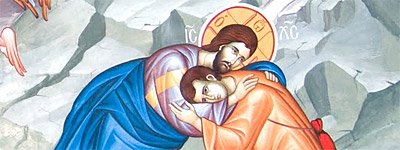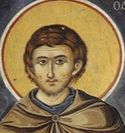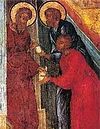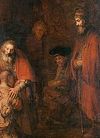

| Previous day | Next day |
| Old Style
February 19
|
Sunday |
New Style
March 3
|
| Sunday of the Prodigal Son. Tone 6. | No fast.
|
![]() Apostles Archippus and Philemon of the Seventy, and Martyr Apphia (1st c.). St. Theodore, abbot, of Sanaxar Monastery (1791).
Apostles Archippus and Philemon of the Seventy, and Martyr Apphia (1st c.). St. Theodore, abbot, of Sanaxar Monastery (1791).
Martyrs Maximus, Theodotus, Hesychius, and Asclepiodota of Adrianople (305-311). Sts. Eugene and Macarius, priests, confessors at Antioch (363). St. Rabulas of Samosata (ca. 530). St. Dositheus of Gaza (7th c.).
St. Mesrop the Translator, of Armenia (439). St. Conon, abbot in Palestine (555). New Nun-martyr Philothea of Athens (1589). New Hieromartyr Nicetas, hieromonk, of Epirus and Mt. Athos, at Serres (1809). St. Nicanor the New, abbot of Hilandar (1990).
Thoughts for Each Day of the Year
According to the Daily Church Readings from the Word of God
By St. Theophan the Recluse

Sunday of the Prodigal Son (34th). [I Cor. 6:12–20; Luke 15:11–32]
The week of the prodigal speaks of so much to us! It speaks about our peace and satisfaction in the house of the heavenly Father, about our mad departure from the Father’s guardianship to unbridled freedom, about the richness of the heritage given us despite our disobedience, about its reckless waste on all sorts of indecencies, and about our utter impoverishment as a result. But then it talks also about how one recovers his senses, and, coming to himself, decides to return to his greatly merciful Father. It talks about how he returns, how he is received lovingly, and is restored to his first state. Who will not find this lesson profitable? If you abide in your father’s house, do not strive for freedom. You see how a similar experience ended! If you have run away and are squandering all, end this quickly. If you have already squandered everything and are living in poverty, decide quickly to return—and then, return. There every indulgence, and all the former love and satisfaction, await you. This last step is the most necessary one. But there is no point in enlarging upon this. All has been said concisely and clearly. Come to your senses, decide to return, arise and hurry to the Father. His embrace is open and ready to receive you.
Articles
 Apostles Archippus and Philemon of the Seventy, and Martyr ApphiaSaints Archippus, Philemon and Apphia, Apostles of the Seventy were students and companions of the holy Apostle Paul. |
 St. Rabulas of SamosataSaint Rabulas was born in the Syrian city of Samosata and he received an excellent education. |
 The Sunday of the Prodigal SonThe Sunday of the Prodigal Son |













